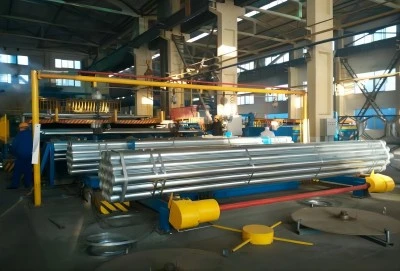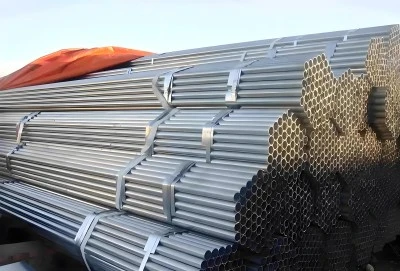The evolution of zinc coated pipe technology has revolutionized the steel industry, offering unprecedented protection against corrosion and extending the lifespan of steel structures. This innovative coating process, which involves applying a layer of zinc to steel pipes, has become integral to various sectors, including oil and gas transportation, water supply systems, and offshore platform construction. As demand for durable, cost-effective piping solutions grows, zinc pipes have emerged as a preferred choice for engineers and project managers worldwide, particularly in challenging environments like the Middle East, Australia, and Southeast Asia.
|
|
|
Evolution of Zinc Coating Technologies for Steel
The journey of zinc coating technologies for steel has been marked by continuous innovation and improvement. From its humble beginnings to today's advanced methods, each step has contributed to enhancing the durability and performance of steel pipes. Let's explore the key developments in this field:
Hot-Dip Galvanizing: The Traditional Approach
Hot-dip galvanizing has been the cornerstone of zinc coating for decades. This process involves immersing steel pipes in molten zinc at temperatures around 450°C. As the steel emerges, it's coated with a thick, uniform layer of zinc that bonds metallurgically with the steel surface. This method provides excellent corrosion resistance and is particularly effective for large-diameter pipes used in industrial applications.
The strength of hot-dip galvanizing lies in its ability to create a durable, long-lasting coating. It's particularly favored in industries where pipes are exposed to harsh environmental conditions, such as in offshore oil rigs or coastal water supply systems. The zinc coating acts as a sacrificial anode, corroding preferentially to protect the underlying steel, thus significantly extending the pipe's service life.
Electroplating: Precision in Zinc Application
Electroplating represents a more controlled approach to zinc coating. In this process, steel pipes are submerged in an electrolyte solution containing zinc ions. An electric current is passed through the solution, causing the zinc to deposit onto the pipe's surface. This method allows for precise control over the thickness of the zinc layer, making it ideal for applications where weight and dimensional tolerances are critical.
The advantage of electroplating lies in its ability to produce a smooth, uniform coating, even on complex shapes. This makes it particularly suitable for smaller diameter pipes or those used in precision engineering applications. However, the thinner coating produced by electroplating may not offer the same level of corrosion resistance as hot-dip galvanizing in extremely corrosive environments.
Thermal Spraying: Advancing Coating Uniformity
Thermal spraying is a more recent innovation in zinc coating technology. This process involves melting zinc wire or powder and spraying it onto the steel surface using compressed air. The molten zinc particles impact the steel at high velocity, creating a mechanical bond. Thermal spraying offers the advantage of being applicable to pipes of any size and can be performed on-site, making it a versatile option for field applications.
One of the key benefits of thermal spraying is its ability to provide a uniform coating thickness, even on large or irregularly shaped pipes. This is particularly valuable in industries like bridge construction or large-scale water transportation projects, where maintaining consistent protection across vast structures is crucial. Additionally, thermal spraying allows for quick application and rapid cooling, minimizing the risk of thermal distortion in the steel pipe.
Innovations in Zinc-Coated Steel Pipe Manufacturing
The field of zinc-coated steel pipe manufacturing has seen remarkable advancements, driven by the need for more efficient, durable, and versatile piping solutions. These innovations have not only improved the quality of zinc coated pipes but also expanded their applications across various industries. Let's delve into some of the cutting-edge developments in this area:
LONGMA GROUP's ERW/LSAW Pipe Production Techniques
Hebei Longma Group has been at the forefront of innovation in steel pipe manufacturing. Their advanced Electric Resistance Welding (ERW) and Longitudinal Submerged Arc Welding (LSAW) techniques have set new standards in the industry. These methods allow for the production of high-quality, large-diameter pipes with superior weld integrity and consistent wall thickness.
The ERW process involves high-frequency electric current to heat and fuse the edges of the steel strip, creating a strong, seamless weld. This technique is particularly effective for producing pipes with smaller diameters, offering excellent dimensional accuracy and surface finish. On the other hand, the LSAW method is ideal for manufacturing large-diameter pipes with thick walls, crucial for high-pressure applications in oil and gas transportation.
Longma Group's integration of these welding techniques with advanced zinc coating processes ensures that their pipes meet the most stringent industry standards for corrosion resistance and structural integrity. This combination of cutting-edge welding and coating technologies positions Longma Group as a leader in providing comprehensive piping solutions for demanding industrial applications.
Double-Sided Coating for Enhanced Corrosion Resistance
A significant advancement in zinc coating technology is the development of double-sided coating processes. This innovative approach involves applying zinc coating to both the interior and exterior surfaces of the pipe, providing comprehensive protection against corrosion. Double-sided coating is particularly valuable in applications where pipes are exposed to corrosive substances on both sides, such as in chemical processing plants or offshore platforms.
The process of double-sided coating typically involves a combination of hot-dip galvanizing for the exterior and specialized interior coating techniques. This dual protection not only extends the lifespan of the pipes but also enhances their performance in challenging environments. For industries dealing with aggressive fluids or gases, such as in oil refineries or wastewater treatment facilities, double-sided zinc coated pipes offer an optimal balance of durability and cost-effectiveness.
Large-Diameter Zinc-Coated Pipes for Industrial Use
The development of large-diameter zinc coated pipes has been a game-changer for industrial applications, particularly in sectors like water distribution, oil and gas transportation, and large-scale construction projects. Manufacturing these massive pipes while maintaining uniform zinc coating presents unique challenges, which have been addressed through innovative production techniques.
One such technique involves the use of automated coating systems that can handle pipes with diameters exceeding 1,000 mm. These systems employ advanced spraying technologies and precise control mechanisms to ensure even zinc distribution across the entire pipe surface. The ability to produce large-diameter zinc coated pipes has opened up new possibilities in infrastructure development, allowing for the construction of more efficient and durable pipeline networks.
Moreover, the advancements in large-diameter pipe coating have led to improved performance in high-pressure applications. These pipes can now withstand greater internal and external pressures while maintaining their corrosion-resistant properties, making them ideal for deep-sea oil pipelines or high-capacity water mains in urban areas.
Future Trends: Smart Coatings for Steel Pipes
The future of zinc coated pipe technology is poised for exciting developments, with smart coatings leading the way. These advanced coatings promise to revolutionize how we protect and monitor steel pipes, offering unprecedented levels of durability and intelligence. Let's explore some of the cutting-edge trends shaping the future of steel pipe protection:
Self-Healing Zinc Coatings for Extended Pipe Lifespan
Self-healing zinc coatings represent a significant leap forward in pipe protection technology. These innovative coatings are designed to repair themselves when damaged, effectively extending the lifespan of steel pipes beyond current expectations. The self-healing process is triggered by environmental factors such as moisture or temperature changes, activating compounds within the coating that fill in scratches or small cracks.
This technology is particularly valuable in applications where pipes are subjected to constant wear and tear, such as in underground water systems or offshore oil rigs. By continuously repairing minor damage, self-healing coatings can prevent the onset of corrosion and significantly reduce maintenance requirements. This not only extends the service life of the pipes but also reduces the need for costly replacements and downtime in critical infrastructure.
Nanotechnology in Zinc Coating for Superior Protection
The integration of nanotechnology into zinc coating processes is opening up new possibilities for enhanced corrosion resistance. Nano-engineered zinc coatings incorporate microscopic particles that can fill in even the tiniest imperfections in the coating surface, creating an ultra-smooth, highly protective layer. These nanoparticles can also be designed to react with corrosive elements, neutralizing them before they can damage the underlying steel.
Nano-enhanced zinc coatings offer superior adhesion to the steel substrate, improving the overall durability of the protective layer. This technology is particularly promising for pipes used in highly corrosive environments, such as chemical processing plants or desalination facilities. The ability to create thinner yet more effective coatings through nanotechnology also opens up possibilities for lighter, more efficient pipe designs without compromising on protection.
IoT-Enabled Coatings for Real-Time Corrosion Monitoring
The integration of Internet of Things (IoT) technology with zinc coatings is set to transform how we monitor and maintain steel pipes. IoT-enabled coatings incorporate sensors that can detect early signs of corrosion or coating degradation in real-time. These smart coatings can transmit data on the pipe's condition to a central monitoring system, allowing for proactive maintenance and preventing catastrophic failures.
This technology is particularly valuable in large-scale pipeline networks, where manual inspection is time-consuming and costly. IoT-enabled coatings can provide continuous monitoring of pipe integrity, alerting operators to potential issues before they escalate. This not only enhances safety but also optimizes maintenance schedules, reducing operational costs and extending the overall lifespan of the pipeline infrastructure.
Furthermore, the data collected by these smart coatings can be analyzed to improve future coating formulations and pipe designs, driving continuous improvement in the industry. As IoT technology becomes more sophisticated and cost-effective, we can expect to see wider adoption of these smart coatings across various industrial applications, from oil and gas to water distribution systems.
The development of zinc coated pipe technology has transformed the landscape of industrial piping solutions, offering unparalleled protection against corrosion and extending the lifespan of critical infrastructure. From traditional hot-dip galvanizing to cutting-edge smart coatings, the evolution of this technology continues to meet the growing demands of diverse industries. As we look to the future, innovations like self-healing coatings, nanotechnology, and IoT integration promise to further revolutionize pipe protection, ensuring more durable, efficient, and sustainable piping systems for generations to come.
Zinc Coated Pipe For Sale
Hebei Longma Group stands at the forefront of zinc coated pipe manufacturing, offering top-quality products that meet global industry standards. Our advanced production equipment, imported from Germany and complemented by our own innovations, ensures the highest quality in every pipe we produce. With a professional team of over 300 employees, including 60+ technical experts, we guarantee expertise in every aspect of pipe manufacturing.
Our comprehensive testing facilities, including ultrasonic flaw detectors and industrial X-ray systems, ensure that every zinc coated pipe meets rigorous quality standards. We pride ourselves on fast delivery, with standard thickness pipes ready in as little as 7 days. Our products are backed by complete certifications, including API 5L, ISO 9001, ISO 14001, and more, ensuring compliance with international standards.
For inquiries or to place an order for our high-quality zinc-coated pipes, contact us at info@longma-group.com. Our team is ready to assist you in finding the perfect piping solution for your project needs.














